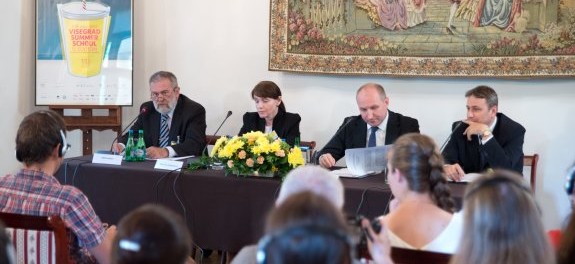
Another feature of the opening day of the eleventh edition of the Visegrad Sumer School was the Debate, evaluating the E.U. Presidencies of the Visegrad countries. This debate was chaired by Krzysztof Bobiński and featured Peter Kormúth, Deputy Head of Mission, Embassy of the Slovak Republic in Poland, Attila Szalai, Counsellor for Cultural and Press Affairs, Embassy of Hungary in Poland, Maciej Szpunar, Under-Secretary of State, Ministry of Foreign Affairs of the Republic of Poland, Gabriela Tomankova representing the Czech Republic and Jerzy Miller, Voivode of the Malopolska Region.
The debate was structured in a manner whereby each person would have a ten minute window to outline their ideas and after that they would interact with the moderator Bobiński. Each expert outlined their perceived successes and failures of their respective nations holding the E.U. Presidency. As Slovakia is yet to hold the Presidency and will have to wait until2016 for the opportunity to hold it, their representative outlined the preparations that are already underway for this prestigious moment. An interesting aspect of the debate was the expert’s insistence on not only highlighting the positive outcomes that the EU Presidency left in its wake, but the more negative instances also. This approach led to widespread approval in the hall and consequently a positive atmosphere evolved from the offset. Each country’s relationship with the European Union was explored and new perspectives were unquestionably formed due to the nature of this approach.By the conclusion of the debate, some wonderfully termed questions put the debaters in tricky positions and forced them to truly investigate how successful the EU Presidencies had actually been. If one were to judge a debate or lecture on the applause it received then this would certainly score highly. Once finished, the room applauded loudly in unison and all present had witnessed a wonderfully engaging debate on the effectiveness of the EU Presidency on the Visegrad nations.












